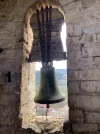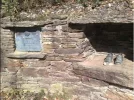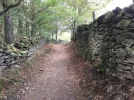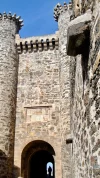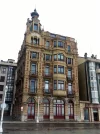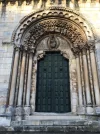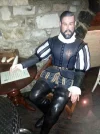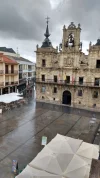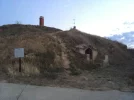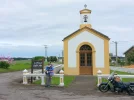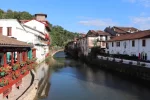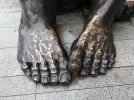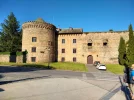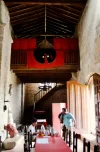The Passionate Man’s Pilgrimage
Give me my scallop shell of quiet,
My staff of faith to walk upon,
My scrip of joy, immortal diet,
My bottle of salvation,
My gown of glory, hope’s true gage,
And thus I’ll take my pilgrimage.
Blood must be my body’s balmer,
No other balm will there be given,
Whilst my soul, like a white palmer,
Travels to the land of heaven;
Over the silver mountains,
Where spring the nectar fountains;
And there I’ll kiss
The bowl of bliss,
And drink my eternal fill
On every milken hill.
My soul will be a-dry before,
But after it will ne’er thirst more;
And by the happy blissful way
More peaceful pilgrims I shall see,
That have shook off their gowns of clay,
And go apparelled fresh like me.
I’ll bring them first
To slake their thirst,
And then to taste those nectar suckets,
At the clear wells
Where sweetness dwells,
Drawn up by saints in crystal buckets.
And when our bottles and all we
Are fill’d with immortality,
Then the holy paths we’ll travel,
Strew’d with rubies thick as gravel,
Ceilings of diamonds, sapphire floors,
High walls of coral, and pearl bowers.
From thence to heaven’s bribeless hall
Where no corrupted voices brawl,
No conscience molten into gold,
Nor forg’d accusers bought and sold,
No cause deferr’d, nor vain-spent journey,
For there Christ is the king’s attorney,
Who pleads for all without degrees,
And he hath angels, but no fees.
When the grand twelve million jury
Of our sins and sinful fury,
‘Gainst our souls black verdicts give,
Christ pleads his death, and then we live.
Be thou my speaker, taintless pleader,
Unblotted lawyer, true proceeder,
Thou movest salvation even for alms,
Not with a bribed lawyer’s palms.
And this is my eternal plea
To him that made heaven, earth, and sea,
Seeing my flesh must die so soon,
And want a head to dine next noon,
Just at the stroke when my veins start and spread,
Set on my soul an everlasting head.
Then am I ready, like a palmer fit,
To tread those blest paths which before I writ.
Sir Walter Raleigh
The first verse of this poem suggests that the icons of the pilgrimage to Santiago were well-known even in 17th century, Protestant England.
Gallant, courtly and multi-talented, Sir Walter Raleigh was the archetypal Elizabethan swashbuckler. He was also highly ambitious and shamelessly schmoozed the Queen, who was furious to discover he had married without letting her know. He inveigled himself back into her favour but her successor, James the First of England, the Sixth of Scotland, did not trust him and clapped him in gaol. His persuasive powers were clearly formidable, however, as he convinced the King to allow him to lead an expedition to the Americas to discover El Dorado, the fabled city of gold, which Sir Walter probably knew perfectly well did not exist. With explicit instructions not to do anything to annoy the Spanish, he did exactly that by attacking and trying to plunder one of their settlements. On his return to England, he was arrested, tried and sentenced to death by beheading. This poem is assumed to have been written by him as he awaited execution. If so, displays outstanding courage and equanimity in the face of death.
View attachment 121567







